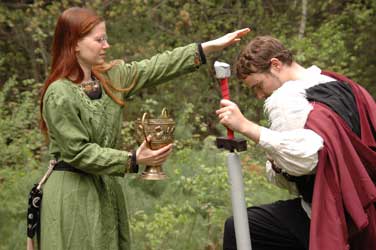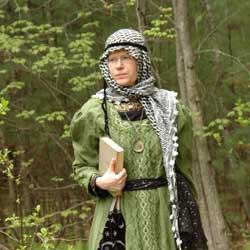Gods & Churches
The Continuing Game's religion is polytheistic, like that of ancient Greece or Rome. There are a number of gods, each with different "territory" and personality.
Click on a god's name to see more information about that god and his/her church.
The Pantheon
| Name | Type | Sex | Form | Symbol |
| Nen | Overgod, Justice, Law | N | Human | Hammer |
| Alia | Love, Fertility | F | Human | Flower of six petals |
| Balthazar | Fate, Fortune | F | Cat | Cat |
| Brinnig | Sun, Light | M | Humanoid | Sun with 12 beams |
| Dorial | Wine, Revelry | M | Human | Wine cup |
| Elune | Wisdom, Knowledge, Magic | F | Humanoid | Eye or peacock feather |
| Furthane | Blacksmiths, Crafts | M | Human | Anvil with star |
| Kahla-ran | Murder, Quick Death | F | Human | Spider |
| Kintaka | Luck, Mischief | M | Human/Fox | (varies) |
| Kyta | Sea, Water, Sailors | F | Mer-woman | Fish |
| Majenir | Healing, Peace | F | Raven | Diamond in circle |
| Perinnia | Hearth, Home, Family | F | Human | Distaff or Egg |
| Rannash | War, Victory | M | Human | Sword with ring pommel |
| Sarana | Music, Poetry | F | Human | Lute |
| Tiranon | Hunt | M | Human | Bow |
| Tralados | Death, Afterlife | M | Humanoid | Chain |
| Ubrialla | Nature, Agriculture | F | Human/Deer | Crescent in moon |
| Zotra | Weather, Storms, Thunder | M | Human | Lightning bolt |
Each entry lists that god's "Cleric kit". Clergy with the Cleric Magic skill may choose to take that kit, a special set of rules unique to the clergy of that god.
Within the description of each god is a section to give an idea of what that god's worship is like: whether vows (chastity, poverty) are common, common spells, etc. This is not binding, as different sects, temples, etc., will have different forms of worship. (These entries describe the mainstream, commonplace depiction of these gods; fringe sects and heretical groups may have unorthodox takes on them.)
Each entry also lists any known details about that church's theology. These sections are not meant to say what "dogma" is, but instead show what constitutes "mainstream" doctrine and practice. You are of course not limited to this material, but may find it useful.
Each entry includes the level of "organization" of each god's church. Highly organized churches will have a well-established, European-like organization, while unorganized churches will usually vary from location to location. (Even for gods with organized churches, nothing is mandatory; you are always able to play a clergyperson of an independent bent.)
Remember: you don't have to have Cleric Magic to be a "priest" (though you do have to have Cleric Initiation).

Choosing a Patron Deity
As a player, you don't have to know the whole pantheon. Many people in the Continuing Game may choose a patron deity and focus their worship on that one god or goddess. On the other hand, some folks choose not to worship one particular patron. And anyone may venerate a particular god for a particular need—for instance, the lovelorn will often turn to Alia, the goddess of love, regardless of who they usually favor in their worship.
However, characters who have the Cleric skill do need to choose a patron deity. Since these characters derive their powers from a connection with the divine, they should work out which deity they follow. These people are usually clergy, or at least people with an especially strong devotion to their patron god. In addition, anyone playing a member of the clergy must take Cleric Initiation, regardless of whether they take Cleric Magic. (Clerics may also wish to take the deity's "kit"; see below.)
You don't have to choose any of these gods, and are free to make up your own, but few players do. That's because these gods are the ones you'll find written into games. The pantheon covers most of the major "portfolios," and any new gods would likely be redundant. Also, choosing a listed god opens you up to lots of potential allies: fellow worshippers!
Church Hierarchy in the Continuing Game
While the world is polytheistic, the religious organizations of each god are closer to medieval Europe than classical Greece. The larger churches may have an organized medieval structure, with bishops, abbots, and hierarchy, and their clergy may go by "Father," "Mother," "Brother," "Sister," and so on. Less popular gods, and smaller sects of any deity, may have less organized congregations.
Polytheism
Since people in the CG are polytheistic, they don't deny the existence of other gods. This is true even if the person has a patron god. Polytheists might encourage others to worship at their temple and to make donations or sacrifices to their patron god, but they don't deny the existence or legitimacy of other gods.
Following a different god is not "heresy"; heresy is a belief conflicting with common doctrine. Heresy against a hated god like Kahla-Ran might earn ridicule, while heresy against a beloved god could earn any number of punishments or persecution.
Remember that one can believe a god exists without wanting the god (or the god's followers) around. Temples of Kahla-Ran do not sit out in public, lest they be burned or otherwise attacked. For the same reasons, it's unwise to declare oneself a follower of Kahla-Ran. On the other hand, most folks would be happy to have a temple of Majenir, peaceful goddess of healing, around the corner!
Polytheism lends a certain amount of flexibility. Unknown gods are usually accepted as legitimate rather than dismissed as superstition or falsehood. In many cases, a "new" god will be deemed a new interpretation or a different name for a known god.
Death and the Spirit
At death, the spirit wanders about the body for a brief while, during which a Restore Life spell can reattach the spirit to the body. After that, the spirit passes to the gate of Tralados, who prevents the living from passing through. Once through the gate, the spirit is judged before Nen. Those of good nature (or at least repentant) pass directly to the heavens; those guilty of spiritual crimes (hatred, murder, theft) are sentenced to the hells for an amount of time proportional to their crimes. When the time has passed and they are repentant, Nen releases them and they pass to the heavens. Only the foulest are sentenced to eternity in the hells. As Nen is ultimately just, prayers are not believed to greatly affect Its judgment nor reduce a soul's time in the hells.
Kahla-Ran is especially hated for being able to circumvent Nen and carry a soul directly to the hells. However, belief holds that once Nen discovers the trick (such as through prayers by friends of the captured soul), the soul is restored to its proper place.
Other Forms of Religion
Non-humans
These descriptions explain human images and worship; the other races may have their own religious practices. Mahiri, for example, call upon spirits, nature, or natural objects instead. Dwarves, too, have their own interpretations of the pantheon. (See the detailed information on mahiri and dwarves at for more information.)
Religion in the South of Hesket

The lands of the South (Marakhin and Kiljukan) do not share the same churches with the North. Similarly, the religious doctrines listed on these pages may be different among those in the south of Hesket
Organizationally, the Marakhs have a religious structure that's more like Arabia than Europe. There is no central religious authority, or any structures that bind one temple to the next, and the Collegium is not recognized as an authority. While some doctrines are common to all, doctrine is dictated by local clergy, and as such may vary from temple to temple, town to town.
The Marakhs may also have different yet similar names for the gods, which sound more Arab to Earthly ears. For instance, Balthazar is called "Balhazra".
While the Kiljuk Empire does not recognize the Collegium, it does have its own Imperial religious authority, the Heyet (HAY-yet). (The word approximates to "panel" or "college".)
Other Info on Religion
- The Collegium, the body that binds Hesket's churches together
- Saints in the Continuing Game
- The cosmology and metaphysics of the CG world
- Religious terminology
- Astrology
